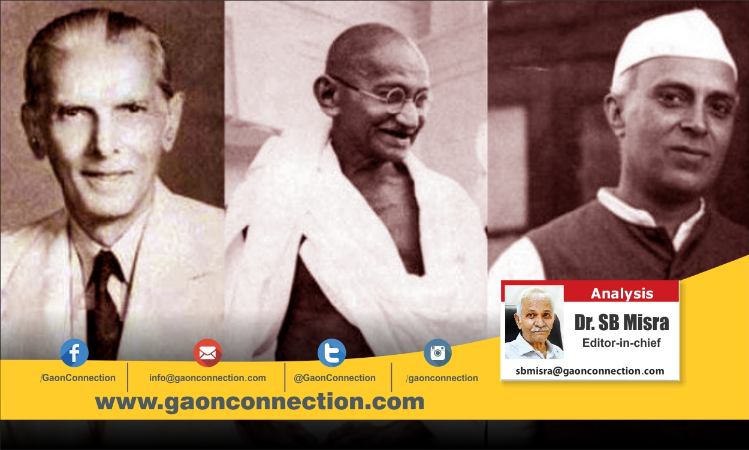Partition of India could have been avoided: Dalai Lama
Gandhi had discussed ways of India gaining Indpendence without partition with Viceroy Lord Mountbatten. Mountbatten asked Gandhi, “What is the option?” Gandhi had said, with full confidence,”The alternative is to dismiss the interim government and form an alternate government under Jinnah.” Maybe Jinnah also wanted the same thing. But Nehru opposed this proposal.
 Dr SB Misra 9 Aug 2018 2:07 PM GMT
Dr SB Misra 9 Aug 2018 2:07 PM GMT

The Dalai Lama recently said that had Mahatma Gandhi pushed the proposal of making Mohammad Ali Jinnah the prime minister of India at the time of Independence, the partition of India could have been avoided. In the days leading up to the partition of India, Mahatma Gandhi did think about it, but Jawaharlal Nehru strongly opposed it. It may be recalled that the same Gandhi now pushing for Jinnah had earlier ensured the elevation of Nehru even at the cost of Netaji Subhash Chandra Bose Sardar Vallabhbhai Patel was also against it; the same Gandhi who had put Nehru above Patel. Now what had happened that had made Gandhi seek to replace Nehru with Jinnah?
At this time, Gandhi also remembered Bose and said, "Bose was a true nationalist." But it was too late, Bose was no more. Historian Durga Das also believes that had Bose been around at the time of Independence, India would not have seen the partition. But even Jinnah was not much impressed by Gandhi. It was Gandhi who was the reason he had left the Congress in the first place and his bitterness was the result of the rivalry between him and Nehru. Hence, hoping that by making Jinnah prime minister the partition could have been averted is a little hard. While we do not know what may have happened, at least we do know that Gandhi tried every option to prevent the partition.
Gandhi had discussed ways of India gaining Independence without partition with Viceroy Lord Mountbatten. Mountbatten asked Gandhi, "What is the option?" Gandhi had said, with full confidence,"The alternative is to dismiss the interim government and form an alternate government under Jinnah." Maybe Jinnah also wanted the same thing. But Nehru opposed this proposal. Mahatma Gandhi never expected that Nehru, who was his protege, whose rise had been possible because of Gandhi's support, would not agree. Or that Patel, who had given up dreams of becoming Independent India's first prime minister at just a hint from Gandhi, would also not agree to Jinnah as prime minister. One can well imagine how much heartache it must have caused Gandhi to even suggest that Nehru's interim government should be dismissed and replaced with a government headed by Jinnah.
It is quite true that for a long time Jinnah was not really interested in the partition of India or the creation of Pakistan. Gandhi was also aware of this. Jinnah was not an overly religious person – he never went on Haj, he did not read the namaz five times every day, he did not even know the aayats of the Quran properly, he ate pork, he believed in the concept of undivided India, he was a member of the Congress party and stayed far away from fanatic Muslims. Historians know why a man like Jinnah went over to the Muslim League which wanted partition, why he celebrated Deliverance Day and saw the subsequent bloodbath.
Jinnah's humiliation started at the Nagpur convention of the Congress where he had opposed Gandhi's satyagraha. "He had said, 'Mr Gandhi, you are using satyagraha to whip up mass hysteria among illiterate Indians. Please stop doing so immediately'." Gandhi's supporters attacked Jinnah. Gandhi was present on stage but said nothing. Slowly, Jinnah's disenchantment with the Congress grew. He did not see a future for himself in the Congress and picked the path of separatism.
Truth be told, Jinnah needed the Muslim League as much as the Muslim League needed Qaid-e-Aazam. Both used each other. If rumours are to be believed, then after the formation of Pakistan and in his dying days, Jinnah was not a happy man. Liaqat Ali was reportedly overheard saying, "The old man is repenting," while coming out of a meeting with Jinnah. This episode finds mention in Durga Das's book 'India from Curzon to Nehru and after'. When LK Advani calls Jinnah secular, it must be seen in this backdrop.
Jinnah did not have much time left in the 40s. He was either suffering from tuberculosis or cancer. This was known only to him and his doctor, Chest Specialist Dr Patel. Jinnah was in a hurry. Had he been made the prime minister of united India, he would have left for his final abode just as he left Pakistan. Maybe partition could have been stalled, but it would not have stopped and who knows, India's condition today would have been the same as that of Pakistan today.
More Stories




